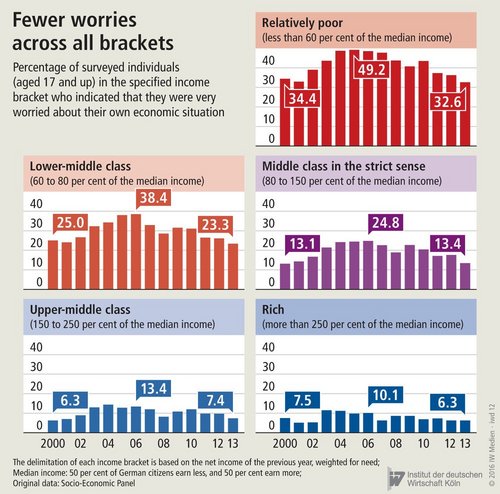A growing gap between the poor and the rich is curbing economic growth. Such is the warning of the International Monetary Fund, OECD and now also DIW President Marcel Fratzscher, who also attests to the notable disparity in Germany. The income differences in Germany are, however, considerably less marked than in many other industrialised countries.

Disparity: Worries are also tied to the economy
Growth setbacks of 160 billion euros in the years 1990 to 2010 represent a loss of 8,000 euros per family of four. With these harrowing figures, Marcel Fratzscher, head of the German Institute for Economic Research (DIW), made it into last week’s Spiegel magazine cover story, “The Divided Nation”.
Fratzscher supports his position with a finding from the OECD, which states that Germany could have achieved nearly 6 per cent higher economic growth after the reunification – if the dividing line between the poor and the rich had not expanded even further.
Economic theory leaves room for both possibilities: disparity can either curb growth or promote it – with the actual result depending primarily on how well developed the particular economy is.
In less developed countries, disparity often leads to the growth momentum slowing down. After all, in such societies, those with a lower income often have more limited access to education, and the expanding gap between poor and rich leads to social unrest and political instability.
In modern industrialised countries, however, disparity can actually promote growth. The rewarding of achievement acts as an incentive for entrepreneurship and innovation.
Income disparity is measured by means of the Gini coefficient, which can range from the value of zero to one. A value of zero means that everyone earns the same income; a value of one means that all income is earned by a single person.
In Germany, the Gini coefficient is presently around 0.29 – placing it below the OECD average of 0.32.
So, how reasonable is the reproach that Germany has exceeded the healthy – that is, motivational – measure of disparity, thereby curbing its growth? Rather unreasonable, as evident in the comparison of disparity and growth figures over time.
The increase of disparity in Germany took place almost exclusively in the period from 2000 to 2005. Unemployment reached a record high at the time, with over five million people affected.
The same period saw the lowest economic growth (an average of 3 per cent) of all five-year periods since 1985. However, since both phenomena appeared at the same time, the one (increasing disparity) cannot have been the cause of the other (low economic growth).
The figures rather suggest that the opposite is true – namely, that increasing disparity is associated with a higher growth rate, not a lower one. This is at least supported by the fact that the five-year period with the largest increase in disparity (3.3 percentage points) is followed by a five-year period in which growth rates increased by 4.5 per cent.
And despite popular headlines such as “Two-class society” or “The middle class fears social decline”, Germany’s citizens seem to take a more relaxed view of the matter.
Representative surveys conducted by the DIW over the past several years within the framework of its Socio-Economic Panel reveal a clear image of the prevailing sentiment (see chart):
In four of the five income brackets, the share of individuals who are very concerned about their own economic situation has decreased with almost every year since 2010; only in the case of the very rich did this trend take a year longer to begin.
The fact that Germany – in spite of the many areas still needing improvement – is largely on the right path and that the social market economy is still worthy of its name can especially be seen in the changing sentiment of two particularly sensitive income brackets:
In the middle class in the strict sense (defined as German citizens earning between 80 and 150 per cent of the median income), nearly 25 per cent of those aged 17 and over were still very worried about their own economic situation in the year 2006. At the time of the most recent survey in 2013, this figure had dropped to 13 per cent. That was the best figure since the turn of the millennium.
Among those at risk of poverty (that is, those earning less than 60 per cent of the median income), the share of individuals who are very worried about their economic situation has dropped from 50 per cent in the year 2005 to the most recent figure of 33 per cent. And this is true in spite of income disparity and the at-risk-of-poverty rate having essentially remained unchanged during this period.
Not only are Germany’s citizens worrying less about their personal situation, they are also expressing a better view on Germany as a whole than they did ten years ago. Back then, over half of the German population struggled with the country’s economic situation; the figure has since dropped to less than one-fifth. This represents the best sentiment since the country’s reunification.
So, the society’s uncertainty has less to do with income disparity and more to do with the economy. The prevailing positive sentiment is thus a reflection of the decrease in unemployment and the increase in real earnings.
More on the topic

Effects of Public Investment on Companies in Germany – Results of the IW Business Survey
Weak public investment activity in Germany has contributed to the low productivity growth of the last decades. Even maintaining the contribution to growth of state-owned capital stock at the already low level of the 1990s would have required an additional ...
IW
Reform of EU-fiscal rules: Lindner's ideas have merit
The German government's proposal to introduce a fixed limit on government spending growth for highly indebted member states in the course of the reform of the Stability and Growth Pact makes sense. Given the macroeconomic environment, such a minimum ...
IW